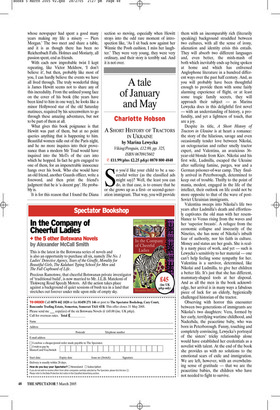A tale of January and May
Charlotte Hobson
A SHORT HISTORY OF TRACTORS IN UKRAINE by Marina Lewycka Viking/Penguin, £12.99, pp. 325, ISBN 0670915602 V £11.99(plus £2.25 p&p) 0870 800 4848 So you’d like your child to be a successful writer (as the classified ads might say)? Well, the least you can do, in that case, is to ensure that he or she grows up as a firstor second-generation immigrant. That way, you will provide them with an incomparably rich (literarily speaking) background straddled between two cultures, with all the sense of irony, alienation and identity crisis this entails. They will absorb two different languages and, even better, the mish-mash of both which inevitably ends up being spoken at home and which has enlivened Anglophone literature in a hundred different ways over the past half century. And, as you will probably have been thoughtful enough to provide them with some fairly alarming experience of flight, or at least some tragic family secrets, they will approach their subject — as Marina Lewycka does in this delightful first novel — with an understanding of history, a profundity, and yet a lightness of touch, that are a joy.
Despite its title, A Short History of Tractors in Ukraine is at heart a romance: the story of the hilarious, savage and even occasionally tender love between Nikolai, an octogenarian and rather smelly tractor expert, and Valentina, an avaricious 36year-old blonde from Kiev. Nikolai and his first wife, Ludmilla, escaped the Ukraine after suffering famine, purges, war and a German prisoner-of-war camp. They finally arrived in Peterborough, determined to keep out of trouble. Thrifty to the point of mania, modest, engaged in the life of the intellect, their outlook on life could not be more opposite to that of the wave of postSoviet Ukrainian immigrants.
Valentina sweeps into Nikolai’s life two years after Ludmilla’s death and effortlessly captivates the old man with her resemblance to Venus rising from the waves and her ‘superior breasts’. A refugee from the economic collapse and insecurity of the Nineties, she has none of Nikolai’s inbuilt fear of authority, nor his faith in culture. Money and status are her goals. She is really a nasty piece of work, and yet — such is Lewycka’s sensitivity to her material — one can’t help feeling some sympathy for her. Valentina is a survivor, determined, like Nikolai and Ludmilla, to give her children a better life. It’s just that she has different, mammary-shaped tools at her disposal. And as all the men in the book acknowledge, her arrival is in many ways a fabulous piece of luck for an elderly, hygienically challenged historian of the tractor.
Observing with horror this encounter between two generations of immigrants are Nikolai’s two daughters: Vera, formed by her early, terrifying wartime childhood, and Nadezhda, the peacetime baby, who was born in Peterborough. Funny, touching and completely convincing, Lewycka’s portrayal of the sisters’ tricky relationship alone would have established her credentials as a novelist with talent. At the end of the book she provides us with no solutions to the emotional scars of exile and immigration. We are left, however, with an overwhelming sense of gratitude — that we are the peacetime babies, the children who have not needed to fight to survive.


























































 Previous page
Previous page